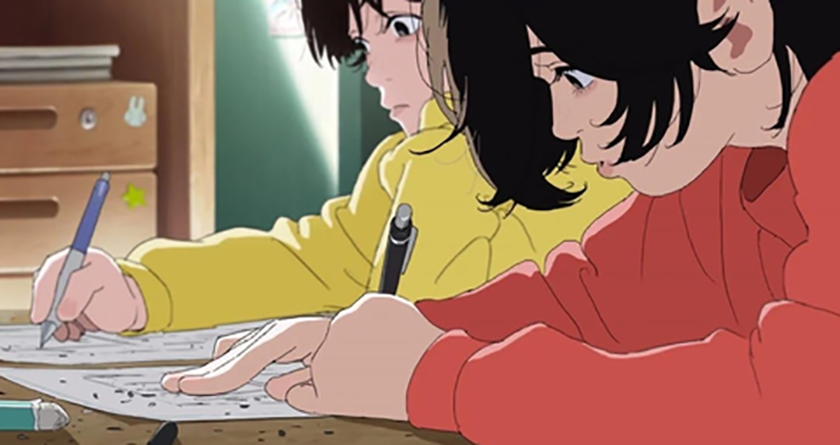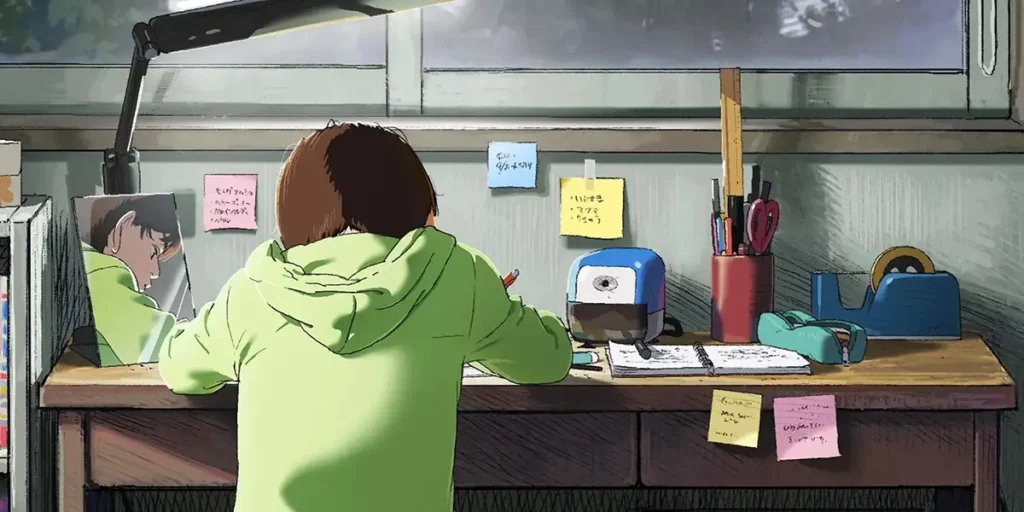Kiyotaka Oshiyama’s Look Back, a tribute to art and friendship, is as heart-breaking as it is hopeful, boasting beautiful animation and a memorable story.
Director: Kiyotaka Oshiyama
Writers: Kiyotaka Oshiyama & Tatsuki Fujimoto
Genre: Anime, Animation, Coming of Age, Drama
Run Time: 58′
Japanese Release: June 28, 2024
U.K. Release: November 7, 2024
Where to Watch: on digital & VOD
Brevity is an underrated and often underutilized quality in filmmaking. At just 57 minutes, Kiyotaka Oshiyama’s Look Back recognises the perils of a film outstaying its welcome, wisely using its short runtime to tell a compact yet complete story. A feature-length effort under an hour long can sometimes be cause for concern — it’s still a significant investment of time that could be wasted on an experience that doesn’t pack the ‘oomph’ of a feature film — but this 2024 Japanese anime movie is immaculately paced and powerful in its simplicity.
It follows an unlikely friendship between two manga enthusiasts, both of whom craft comic strips in their free time for their school’s newsletter. The relatively popular Fujino (Yumi Kawai, Plan 75) feels that her world has been upended when a shut-in who never attends school, Kyomoto (Mizuki Yoshida), begins to publish her comic strips alongside this protagonist’s stories. A one-sided but bitter rivalry is formed, with Fujino working diligently to match Kyomoto’s efforts, often to the detriment of her social life and mental health. Look Back expertly demonstrates the frustration of coming up short in a pursuit you care deeply about, made all the more painful by Fujino’s unwillingness to relinquish her self-importance and outward overconfidence.
The fictional worlds these two teens create are beautifully realised, whether it’s the rough-around-the-edges, zany storytelling of Fujino that is a joy to tunnel through, or Kyomoto’s serene, gorgeous compositions, which are so idyllic you can almost feel a cool breeze wafting over your arms as you view these gentle, picturesque snapshots. It is clear that an enormous amount of time and effort went into portraying the pair’s comics, and it pays off in spades.
Clever visual tricks underscore Fujino’s despair, like the camera continually moving away from her once she witnesses Kyomoto’s drawings, pulling back to show an improbably giant classroom. This fantastical image is an insightful, well-crafted recreation of how small this protagonist feels at that moment. While the film’s visuals are able to settle us into Fujino’s mindset, Kyomotos’ characterisation still leaves something to be desired. It takes quite some time for this reclusive preteen to be introduced into Look Back, and for good reason, since at first she needs to exist in Fujino’s mind as a concept of artistic perfection so viewers can feel empathise with this protagonist’s sorrow at not being good enough.
When it is revealed that Kyomoto is actually an ardent fan of Fujino’s work, jumping at the chance for the pair to work together, one can’t be fully endeared to these developments when the former character is so aggressively childlike, fawning and hesitant. Look Back leans too strongly into cutesy, trivial fare in these moments, an approach that might have worked in another anime but which is wholly incompatible with this film’s fairly realistic depiction of early adolescence. Kyomoto is anxious to the point of parody; viewers wouldn’t be jumping the gun to assume that she has a severe speech impediment given the way she talks.
It turns out she’s just shy to the extreme. But Kyomoto is obsessive, too, and eager to share her feelings. It’s not intrinsically a bad thing that the character is more stereotypical than Fujino, since it’s always the latter’s worldview that viewers follow. But her behaviour steps a few paces too far into clichéd territory, inhibiting immersion somewhat. Despite this, the story is still very absorbing, believably depicting these girls’ unlikely friendship through their shared love of manga. The joy of creating art is abundant in Look Back, and is infectious enough to make even the worst of artists daydream about picking up a pen or pencil and starting to sketch.
This is a film about the diverse reasons people make art, beginning and ending in extremes that are satisfying and poignant to reflect on once the end credits have rolled. This affecting tale resists making itself too sweet, or heavily relying on narrative tricks in its later sections. Fujino and Kyomoto are tragic without ever being forlorn. They don’t need viewers’ pity; they are beyond it. It’s rare to see that kind of dignity and grace afforded in fiction to two wide-eyed young girls, who, even as they grow older, don’t lose that creative spark which connects them to the joys of their early union.

For as beautiful and bittersweet as Look Back is, it suffers in how little it has to show for the more mundane aspects of creation. Years pass by in these characters’ lives in a minute or so. This section of the narrative is contorted into a strange zone where its protagonists’ inner voices are rendered mute after an insightful opening section, choosing instead to breeze through a montage of their exploits.
Oshiyama’s film redeems itself handily on this front in later moments, but just a slightly wider window into this collaborative portion of their lives would have made its drama heart-stopping and its hopefulness profoundly moving. But the fact that this movie comes so close to this emotional endpoint is a fine achievement in its own right, packing a powerful punch within its short runtime that will linger in viewers’ minds long after the end credits have rolled.
Kiyotaka Oshiyama’s Look Back is now available to watch globally on digital and on demand.

